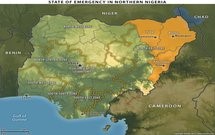 An attack on a Nigerian air base shows that ongoing military operations in northeastern Nigeria have not prevented Boko Haram from mounting attacks in the urban centers of the northeast, despite government claims to the contrary.
An attack on a Nigerian air base shows that ongoing military operations in northeastern Nigeria have not prevented Boko Haram from mounting attacks in the urban centers of the northeast, despite government claims to the contrary.
However, the attack -- notable for both its size and target -- does not necessarily note new capabilities or a departure from the previous pattern of attacks. Boko Haram continues to be primarily active in northeastern Nigeria and does not yet pose an existential threat to the Nigerian government itself.
Boko Haram attacked an air base in Maiduguri, the capital of the northeastern Nigerian state of Borno, on Dec. 2. The attack was launched around 2:30 or 3 a.m., according to local reports, with firefights continuing for approximately five hours. While the air base seems to have been the main target in the attack, the Maiduguri International Airport -- which hosts the air base -- as well as several military checkpoints and nearby shops and fuel stations were also targeted.
Boko Haram fighters allegedly destroyed several aircraft and military vehicles and set fire to a number of buildings, but the Nigerian military claims to have successfully kept the militants from setting fire to the Maiduguri International Airport building. The military also claims to have killed 24 of the attackers and that only two soldiers were wounded while repelling the attack.
According to reports, more than 300 Boko Haram fighters attacked the air base, riding trucks and allegedly an armored vehicle captured from the military, and attempted to destroy vehicles and infrastructure by using explosives, rocket-propelled grenades and fire.
The attack prompted a large military response depending heavily on airstrikes against the militants. During the aftermath of the attack, Borno state declared a 24-hour curfew in Maiduguri, effectively shutting down any traffic within the city to limit civilian casualties and facilitate the search for remaining Boko Haram militants.
Although Boko Haram has launched significant attacks before, operations by such large groups of militants have grown less frequent as ongoing Nigerian military operations have attempted to disrupt the militants' movements and staging. Nigerian security forces have been conducting ground operations aiming to locate and destroy pockets of Boko Haram fighters.
Therefore, this attack does not demonstrate a new capability for the militant group; rather, it highlights the ineffectiveness of Nigerian military efforts to interdict militant attacks on critical locations, whether urban areas or military installations. The attack bears the hallmark of many persistent insurgencies that -- like Boko Haram -- have been made up of lightly armed, mobile forces able to blend in and disperse but also able to mass at critical times for assaults.
The target of this most recent attack is also notable considering Boko Haram's previous choices of mostly soft targets, such as smaller military garrisons, prisons, churches and other civilian facilities. Moreover, the location of the base -- in a major urban center -- discredits the Nigerian security forces' claims that they had fully secured the main cities and had limited Boko Haram's activity to the rural areas of the northeastern states.
Boko Haram's targeting of military aircraft and the base from which they operate could indicate an attempt to delay or interrupt ongoing operations against Boko Haram camps in the northeastern states of Borno, Yobe and Adamawa, which have been under a regional state of emergency since May 14.
During the attack, militants were able to destroy three military aircraft -- although military officials claimed they had been decommissioned already -- as well as two military helicopters. The group's success in destroying equipment critical to Nigerian military operations against the militant group could compel Boko Haram to attempt attacks against similar targets in the future.
Despite Boko Haram's ability to mount such a notable attack, the militant group is still not an existential threat to the Nigerian government. It continues to be limited in both geographic reach and military capabilities. Boko Haram's attacks continue to be primarily located within the northeastern states of Nigeria. Although the group has carried out limited operations such as bombings or kidnappings outside that area, other regions of Nigeria lack the specific conditions that allow the group to operate.
Boko Haram's core support still comes from ethnic networks, specifically within the Kanuri, the main group from which Boko Haram militants are recruited. These ethnic networks extend into southeastern Niger and northern Cameroon as well, although northeastern Nigeria is the only place where the Kanuri are even a sizable minority. Boko Haram has never been able to transcend its ethnic identity, and this confines the group to Nigeria's northeast.
Courtesy : Stratfor (www.stratfor.com)